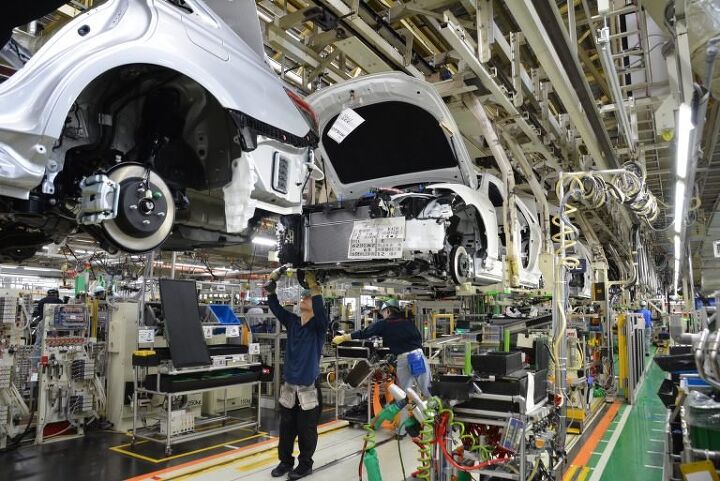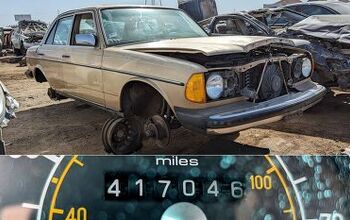Japanese Automakers Stand to Lose $1.6 Billion From Coronavirus: Analysts

Coronavirus outbreaks are shrinking sales expectations around the globe, but it’s Asia that has the most to lose. We’ve already seen rolling reports of the Chinese market’s virus-related decline — an affliction that’s spilling over into neighboring regions as more people fall ill and others stay home to avoid contagion. Employees, parts, and customers are all in short supply.
Goldman Sachs now predicts global sales will decline 3.5 percent in 2020. It’s a considerably more foreboding estimate than the 0.3-percent contraction predicted just last month, and the decline is presumed to hit Japan the hardest — after China, of course.
Waning demand is expected to evaporate 170 billion yen ($1.6 billion) from the country’s top automakers, according to Automotive News.
“Even if production resumes along the lines we are assuming, recovery will hinge on end-user demand in China,” analyst Kota Yuzawa wrote in the report. “While these figures tend to be highly volatile, automakers are clearly facing challenges from both a production and sales perspective.”
From Automotive News:
The spread of the illness, which has shut down factories in Hubei, China’s fourth-largest vehicle-manufacturing hub, has had a ripple effect across the global auto industry. Toyota Motor Corp., Nissan Motor Co., Honda Motor Co., Mitsubishi Motors Corp. and Mazda Motor Corp. rely on parts from the country even if they assemble vehicles elsewhere.
All told, the five manufacturers will build 580,000 fewer cars from January through April compared with Goldman Sachs’s previous estimate. Among them, Toyota is estimated to run at 94 percent of the bank’s prior projection during the period, while Honda will be at 16 percent, and Nissan at 47 percent.
Last month, the government-backed Chinese Association of Automobile Manufacturers estimated sales declines of around 40 percent in the January-to-March period from a year earlier, with production volumes falling by up to 60 percent. With Chinese auto sales down 83 percent in the third week of February, the reality could be quite a bit worse than initial estimates suggest. It all hinges on how quickly China can wrangle the virus and get things back to normal.
Japan is considering temporary legislation on March 12th that would enable the government to declare a state of emergency if necessary; it already plans to restrict travel from China and South Korea ( also hit hard by COVID-19) for a period of several weeks. The country recently formed the New Coronavirus Countermeasures Automobile Council to help automakers prevent the spread of the virus while contending with component shortages.
[Image: Toyota]

A staunch consumer advocate tracking industry trends and regulation. Before joining TTAC, Matt spent a decade working for marketing and research firms based in NYC. Clients included several of the world’s largest automakers, global tire brands, and aftermarket part suppliers. Dissatisfied with the corporate world and resentful of having to wear suits everyday, he pivoted to writing about cars. Since then, that man has become an ardent supporter of the right-to-repair movement, been interviewed on the auto industry by national radio broadcasts, driven more rental cars than anyone ever should, participated in amateur rallying events, and received the requisite minimum training as sanctioned by the SCCA. Handy with a wrench, Matt grew up surrounded by Detroit auto workers and managed to get a pizza delivery job before he was legally eligible. He later found himself driving box trucks through Manhattan, guaranteeing future sympathy for actual truckers. He continues to conduct research pertaining to the automotive sector as an independent contractor and has since moved back to his native Michigan, closer to where the cars are born. A contrarian, Matt claims to prefer understeer — stating that front and all-wheel drive vehicles cater best to his driving style.
More by Matt Posky
Latest Car Reviews
Read moreLatest Product Reviews
Read moreRecent Comments
- Calrson Fan Jeff - Agree with what you said. I think currently an EV pick-up could work in a commercial/fleet application. As someone on this site stated, w/current tech. battery vehicles just do not scale well. EBFlex - No one wanted to hate the Cyber Truck more than me but I can't ignore all the new technology and innovative thinking that went into it. There is a lot I like about it. GM, Ford & Ram should incorporate some it's design cues into their ICE trucks.
- Michael S6 Very confusing if the move is permanent or temporary.
- Jrhurren Worked in Detroit 18 years, live 20 minutes away. Ren Cen is a gem, but a very terrible design inside. I’m surprised GM stuck it out as long as they did there.
- Carson D I thought that this was going to be a comparison of BFGoodrich's different truck tires.
- Tassos Jong-iL North Korea is saving pokemon cards and amibos to buy GM in 10 years, we hope.


































Comments
Join the conversation
It will hit all makers and suppliers proportionally. No one gets a free pass. The only advantage goes to those who can take advantage of any economies of scale they are afforded, and the fortune of those with facilities and suppliers in places where governments take aggressive containment actions. Additionally, correctly predicting the correct product mix and availability for any pent up demand on the other side of this, will serve them well. PS Wishing everyone good health. :-)
Many experts were predicting a recession even before this virus hit. This is a massive piece of uncertainty that throwing money around will not fix. We just need to make sure we keep ourselves healthy and hope that the healthcare system is made ready for "moderate" case scenario.